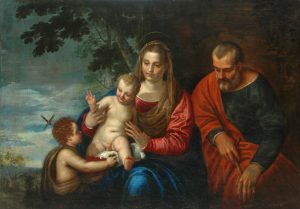Thoughts on Sunday’s Lessons for Dec. 31, 2023 (Christmas 1)

Holy Family with St. John the Baptist (1580s), oil painting by Benedetto Caliari (c.1538-1598). King John III Palace Museum , Wilanów, Warsaw, Poland. (Click image to enlarge.)
First Reading: Isaiah 61:10-62:3
Joy to the world! Christmas has come, and the Word that was present at the moment of creation now brings us the light of God and dwells among us. In the first reading for the Sunday after Christmas Day, Isaiah’s great book of prophecy has reached its closing chapters. The people have returned from exile; even if there is plenty of hard work yet to be done, the mood is joyous and exultant. The prophet shows us appealing images of the people as a joyous bridal pair looking forward to a new life together, and of God as a nurturing gardener. The reading concludes by celebrating the new Zion’s righteousness and praise for God as an example to all the nations.
Psalm: Psalm 147:[1-12]13-21
God’s promises have been fulfilled! Praise the Lord, or in the original Hebrew, Hallelujah! One of the six hymns of praise and triumph that complete the Psalms, these verses ring in harmony with the Isaiah reading for the day, exulting in the people’s return from exile to rebuild Jerusalem with God’s help. Here again we see an image of God as nurturing keeper of a divine garden, sending gentle rain for grass and crops and finest wheat, nurturing food for our flocks and herds and for us all.
Second Reading: Galatians 3:23-25; 4:4-7
In this early letter to the Christian community in Galatia, Asia Minor, Paul reminds us that God sent Jesus, born of a woman and fully human, to make us all the children and heirs of God. In its original context, Paul was offering advice to a mixed community of Jewish and Gentile Christians who were struggling between accepting God’s free gift of grace through faith and returning to the works and discipline of the old law. Paul’s arguments here, and in his later letter to the Romans, fueled a great debate over justification by faith or works centuries later in the Reformation.
Gospel: John 1:1-18
While Matthew’s and Luke’s Gospels start with the Christmas story of the birth of Jesus, and Mark’s begins with Jesus’ baptism, John’s Gospel is decidedly different. Poetic and spiritual, rather like a hymn, it sings the glory of God’s own word becoming flesh, living among us, lighting up the world. The Word that was in the beginning with God, when God said, “Let there be light,” is now, will be, and in God’s time always has been, incarnate as human flesh, Jesus, God with us.
